
HAPPY EASTER EVERYBODY!
Just as Jesus was resurrected on this day, so is my Star Wars frustration!
One of the more toxic trends I’ve seen lately is this act of making money off of complaining about franchises, Star Wars being one of the biggest examples. These complaining videos started out genuine. They were people who loved Star Wars voicing their frustrations over the questionable choices Lucasfilm was making. But what happened, unexpectedly, was the channels became gigantic financial successes and everyone realized you could make a lot of money complaining about big franchises.
It’s quite ironic, this cottage industry of hate-mongering, as one of their biggest criticisms is that Disney and Lucasfilm have all these shills propping up Star Wars when it doesn’t deserve it. Yet if you look through the history of these posters, their videos all read the same, “Star Wars is Dead,” “Mandalorian Worse Ratings than Rings of Power!” “How Grogu Became Nothing But a Meme.” “Kathleen Kennedy Hates You.” These Youtubers would never post a positive review because positive reviews aren’t on brand and, therefore, don’t make them money. So they’ve become just as untrustworthy.
The problem with this Evil Empire of Criticism is that it’s made talking about the very real problems that Star Wars has difficult. Cause people just assume you’re one of the for-profit haters. It allows Lucasfilm to protect itself against real introspection. If they can paint every negative critique as disingenuous, they don’t have to look inside themselves.
For those who don’t know, Star Wars had their official Star Wars Celebration this weekend where they announced three new movies. The weekend had a bit of “gun to the head” feel to it. Kathleen Kennedy has done everything in her power to avoid announcing a Star Wars feature film slate due to the PTSD she’s suffered from the recent trilogy. But she had to announce something this weekend. And this is what we got:
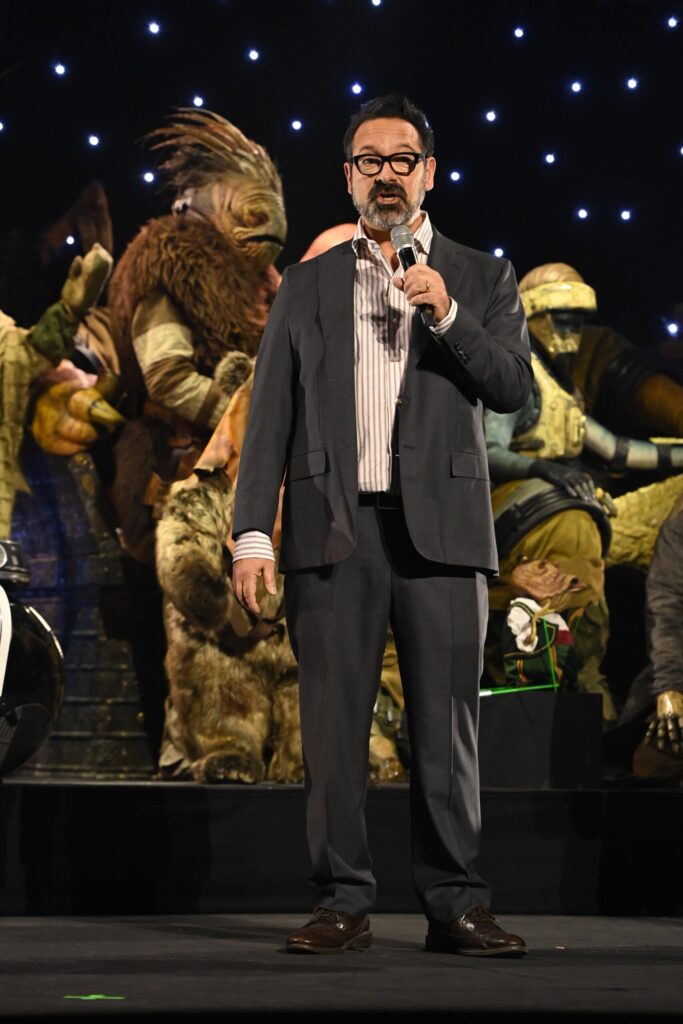
James Mangold Film – Of the three films announced, this one has the most potential. It’s about the birth of the very first Jedi, set 25,000 years before Star Wars. We’ve never explored that far back in the Star Wars universe, which allows for some really unique possibilities. Just the way you design that universe could allow for a Star Wars film that looks and feels different from anything we’ve seen before. Mangold, who’s best known in nerd circles for directing Wolverine, says that his movie is inspired by Ben-Hur. So it’s going to have major religious undertones, which makes sense considering it’s about The Force. Lucasfilm just made the latest Indiana Jones film with Mangold. This would imply that they’re happy with him. However, there is one thing that worries me. If Indiana Jones doesn’t do well – which is a real possibility considering it features an 80 year old action star (I know, I know, 80 is the new 40) – this film probably won’t get made. We know that from what happened to Patty Jenkins after Wonder Woman 1984, Colin Trevorrow after The Book of Henry, and Taika Waititi after Thor: Love and Thunder (I know Taika’s movie is supposedly still in development but the fact that it has no script yet after two years tells me it’s probably not happening).
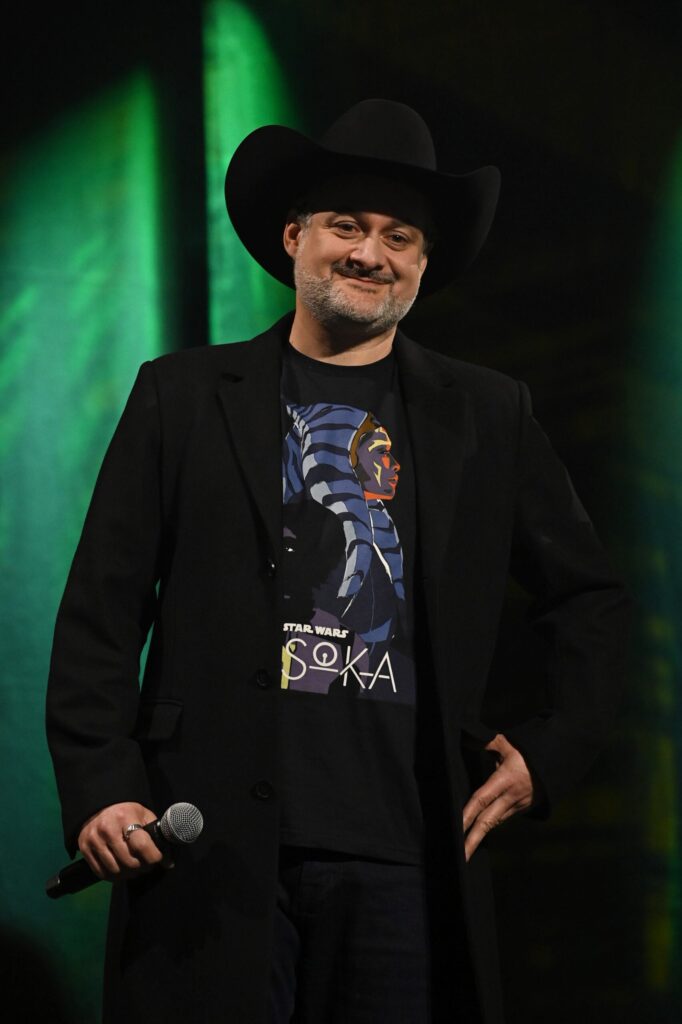
Dave Filoni Film – What Dave Filoni is great at is animated storytelling. His child-like sensibilities and basic storytelling skills are perfect for a non-discerning audience such as 10 year olds and ultra-hardcore Star Wars fans who will eat up anything the franchise serves them. Which is why his Rebels show is so popular. But the niche world of animated TV is a completely different ballgame compared to the feature film world. The stakes in feature films have to be gigantic. The characters have to be bigger, more grounded, and have more depth. The plot and pacing need an 8 cylinder engine running underneath them at all times. I just don’t see those skills in Filoni. I see him as someone who loves Star Wars and loves to – successfully I may add – incorporate deep-cut characters into the universe in fun ways. But those skills mean nothing in a feature film. So I was concerned when Filoni’s project was announced. But then I heard that his movie is going to be a culmination of all of the Star Wars shows (Mandalorian, Ahsoka, Boba Fett). And what that tells me is that it’s going to be a Disney Plus TV exclusive. They did not announce that. That’s my own assumption. But it makes sense. This allows Filoni to play in this bigger higher-stakes sandbox to see if he’s got the chops to be there without putting a ridiculous amount of money and resources on the line. A Disney Plus exclusive Star Wars movie is literally perfect for Filoni. And look, if he knocks it out of the park, by all means, give him a real feature film.
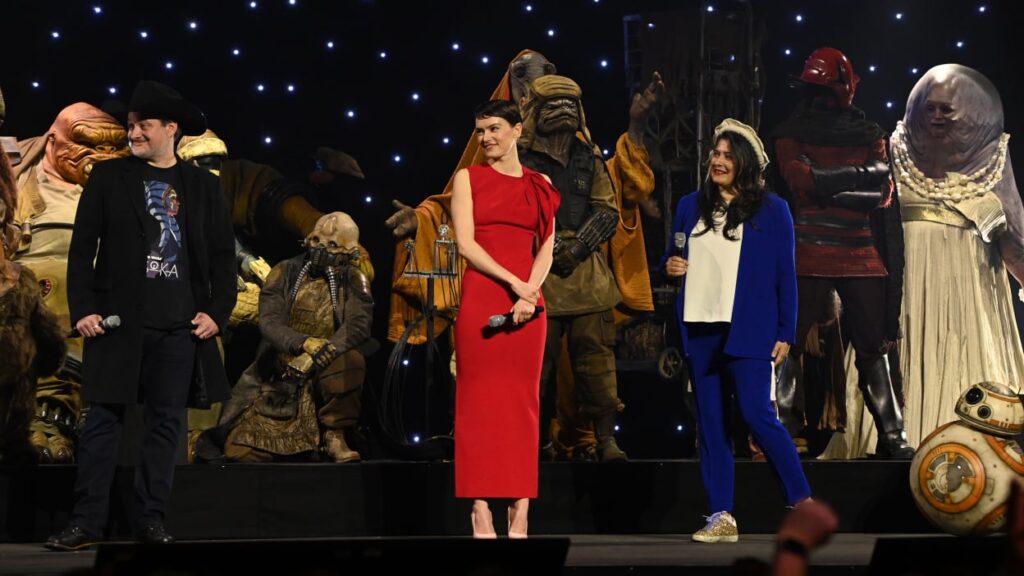
Rey Film – This project is the one that not only shocked me, but shocked the world. Rey is a barely above average character. And she’s just come off a trilogy that left a bad taste in peoples’ mouths. By the way, this is the project Damon Lindelof just left. In his classic self-deprecating manner, Lindelof said it was because he just couldn’t write a good enough script. But what he really seemed to be saying was, “I’m not sure this is a story worth telling.” The project is being directed by Sharmeen Obaid-Chinoy, a director who wasn’t even the best director on the fourth best Marvel TV show. If you’re going to give a Star Wars movie to a director from Ms. Marvel, give it to Adil El Arbi and Bilall Fallah! Their pilot episode to that show was awesome! The only way I see this movie succeeding is if they bring back Kylo Ren. Rey becomes infinitely more interesting when he’s around. I know he just died. But what does death even mean in movies these days? But I could see a potentially fun movie if Rey and Kylo were teamed up.
Regardless of whether you agree or disagree with my assessments of the trio of announced projects, one thing was very clear about the celebration: Kennedy is unsure of herself. Even the fact that they’re only announcing one Rey movie, as opposed to a trilogy, which is standard procedure – that indicates how gun-shy she is. And that, more than anything, is what makes me skeptical that we’ll see all of these films. Filoni’s film is supposedly 5 years down the line. So much can change in that time period. Will there even be a Disney Plus?
As a Star Wars mega-fan whose love for the franchise has been waning as of late, I know something needs to change. But I don’t know what. There’s some indescribable magic to the formula George Lucas brought to the table that seems to be harder to replicate than we thought. There have been low-key rumors that Lucas is coming back into the mix in some way. That’s probably the smartest move Lucasfilm could make right now. Bring back those weird ideas he had for Episodes 7-9 and reimagine them for the next wave of films. If you really wanted the fandom back on your side, that’s the move you would make.
Remember to sign up for David Aaron Cohen’s “the business of screenwriting” class where you learn how to get an agent, how to navigate TV writers’ rooms, how to deal with producers and their notes, how to pitch, and much much more. The class is already half full in just a weekend. Slots will continue to fill up quickly. Check out the bottom of this post to get your big $300 Scriptshadow discount!
Today, I want to introduce you to a friend of mine, David Aaron Cohen. David’s been working as a writer in this business for 30 years. The two of us have bonded over our Chicago deep-dish roots and mutual love of tennis, specifically our fascination with the sport’s newest superstar, Carlos Alcaraz. David was able to see him live in Indian Wells a couple of weeks ago. I’m still jealous.
Recently, David told me about a class he’s been wanting to put together forever that focuses on teaching writers something that’s never taught: how to navigate the business side of the industry. We’re not talking about how to write a good logline or how to nail those first 10 pages. We’re talking about how to pitch, how to get an agent, how to sell to streamers, how TV writers rooms work, how to navigate a writing assignment when you’re dealing with four different producers – the kind of stuff we’ve all wished there was a class for. Well, now there finally is.
It’s going to be a 9 part Zoom course, each session being 2 hours long, and it’s definitely going to fill up fast. So you’ll want to register as soon as possible. Sign-up details will be at the bottom of the post.
For those of you who don’t know anything about David, he had a movie released last year called AMERICAN UNDERDOG (a 98% audience rating on RT), has two tv series in development – one with Sony, one with Lionsgate, just finished adapting the international best-seller, MAN’S SEARCH FOR MEANING. Going back deeper into his catalog, he co-wrote THE DEVIL’S OWN, starring Harrison Ford and Brad Pitt. He also wrote one of the great sports movies of all time, FRIDAY NIGHT LIGHTS.
In order to get a feel for David and what he’s like as a teacher, I asked him to share a few of the biggest lessons he’s learned in the business. But before we get to those, I demanded he tell me (and you) the craziest story he’s ever experienced as a screenwriter.

DAVID AARON COHEN: There have a been a few. LOL. Here’s one. 2017 I get a call from a director friend of mine. He’s been hired to make a 10 million dollar movie with John Travolta. Only catch is, we have to write a script for him to read and sign off on by February 5th. I look at the calendar. It’s January 14th. What the hell? We break the story in 5 days, card it, set our page counts, and work 21 days straight. Deliver it to the producer who gives off the worst vibes. Total hustler. But his check cleared.
Travolta reads and approves the screenplay. Casting happens: Katheryn Winnick, Tom Sizemore (one of his last roles). Pre-production. Shooting in Puerto Rico. I do some rewrites. Jodi, the director (not his real name!), heads off to the island. The day before principal photography starts, the line producer (who’s in cahoots with the shifty producer) announces that instead of the 5 million dollars left in the budget for shooting, there’s only 1.9 million. Have to cut 35% of the script. IN ONE DAY. You can imagine how that turned out. The producer literally STOLE the other 3 million dollars. Against all odds, Jodi kept shooting. Then a hurricane hit Puerto Rico and destroyed all the sets. I kid you not. Somehow, he finished the movie.
I saw bits of it back in L.A. We made a plan to do re-shoots with the contingency budget to make all the plot holes make sense. But the producer had STOLEN that money too. Then he fired the director. Edited the movie himself. Delivered it to the distribution company. I still haven’t gotten drunk enough yet to watch it, although I have read some of the audience reviews. They’re hilariously bad. But here’s the final plot twist. Last summer I log onto Netflix, looking to watch the new Adam Sandler movie HUSTLE, and I see this: “TOP TEN MOVIES STREAMING IN THE U.S.: NUMBER 9 – SPEED KILLS”
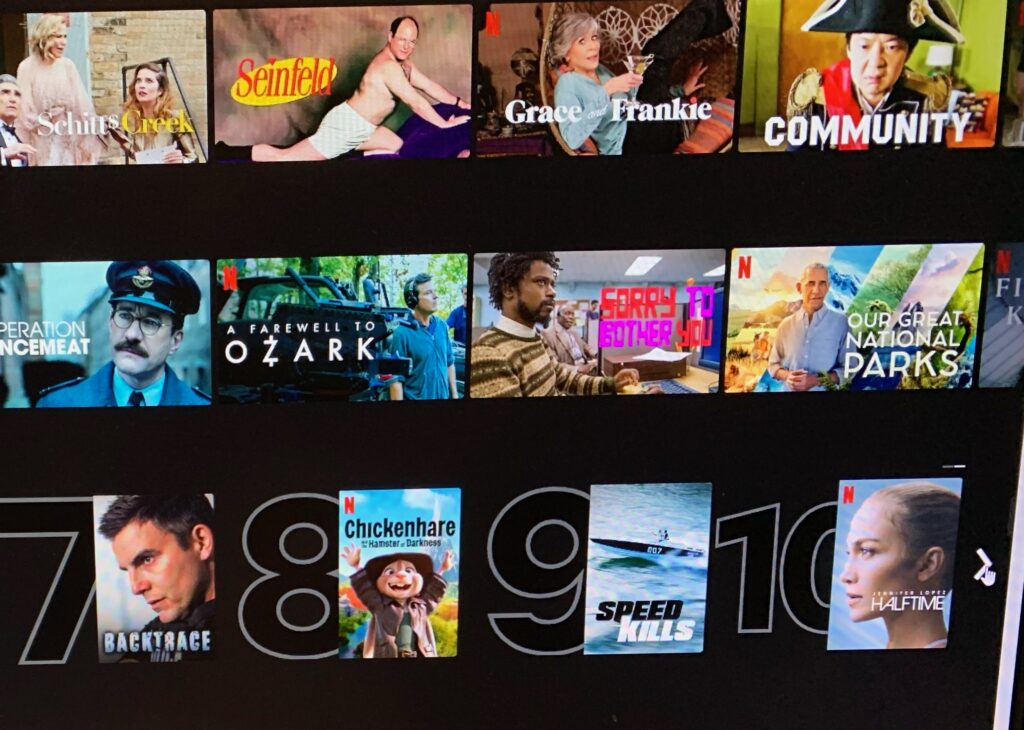
As someone once said, “there’s no accounting for taste.” Or chalk it up to a great poster.
CARSON: This is literally my worst nightmare! And yet, my Friday night viewing is set. Did you see what I did there? “Friday Night.” :) Okay, let’s jump into the lessons. Take it away, David!
*************************************************
DAVID: Thanks, Carson. I want to start by sharing an “Ah-Ha” moment from earlier in my career. It’s something I call…
MAKING MOONSHINE
This is a process critical to every story you ever want to tell. How do you make moonshine? Take your basic still out in the backwoods, fill it with mash. Heat that up with steam. The mash sinks to the bottom, but the vapors that rise are pure alcohol. That’s your job, making those vapors. When they condense back into liquid, you’re drinking moonshine. Which is a really convoluted way of saying, DISTILL YOUR STORY DOWN TO ITS ESSENCE. Distill! Distill! Distill! Put it into the pressure cooker of your heart and soul and guts until those vapors start to rise. All great stories start with essence.
Here’s one example. My big break in Hollywood was getting tapped by director Alan J. Pakula (ALL THE PRESIDENT’S MEN, SOPHIE’S CHOICE, KLUTE, etc.) to adapt a little-known non-fiction book called FRIDAY NIGHT LIGHTS. I wrote a first draft which everyone agreed got the tone right, but little else. I kept going. I was flailing around. Six months passed. The studio panicked and so did I, but Pakula didn’t. He pushed me to dig deeper, to find the essence of the story, to go find the core. We talked. We went back and forth. Is it the coach’s story? The quarterback’s? There was a lot of father/son energy. Maybe that was the key. But none of those ideas provided the throughline we were looking for – the central idea that was bigger than any individual character. Without that idea, all I had was mash.
What does it mean on a story level to heat up the mash? It means being curious. Fearless. Letting go of fixed ideas. And doing the research. I had spent a couple weeks in Odessa a year prior, meeting with the players who were on that 1988 Permian Panthers team. They were three years out of high school, but still haunted by their experience, by the feeling they had let everyone down. I could sense the heat there, when I put myself in their shoes, when I opened my writer’s self to what they were feeling.
I remember the moment it all crystallized. I was sitting in a little anteroom of Pakula’s New York City office, next to a pile of old luggage. And then this sentence kind of hit me, like a download. This is a story about a group of high school football players who carry the hopes and dreams of an entire town on their shoulders. That was it. Moonshine in twenty-five words. I sat down and wrote the draft that became the movie, guided by that idea. It poured out of me in like four weeks because I now knew what FRIDAY NIGHT LIGHTS was about. What every character was feeling. Go watch it. You’ll see that all the scenes serve that master, that controlling idea, that logline – call it whatever you want. I call it MAKING MOONSHINE.
PITCHING IN THE ZOOM AGE
One of the most critical skill sets you need to master to succeed in our business is the art of the pitch. Great stories CONNECT with people. When pitching, you are the CONNECTOR. Think of it like an electric circuit. The story is the current. You’re the switch. When you flip the switch, that story energy must ELECTRIFY your audience. And I’m not talking about reaching their heads. The jolt of your story has to hit them right in the gut. The solar plexus. First chakra. Does that sound hard? It should. Because it is. But if you’ve done your homework, if you’ve made your moonshine, you’re ready.
Back in the late 80’s when the whole “high concept comedy” idea was dominating Hollywood, I used to laugh and say the opposite is true. ‘High concept’ is just code for the stupidest, low-brow humor – the classic example back then being a five-word pitch: “DANNY DEVITO, ARNOLD SCHWARZENEGGER: TWINS!” But with 30 something years of pitching in the rear-view mirror, I look at that and see genius. It’s like the Michelangelo of Moonshine! Five words that conjure up an entire movie! Twelve syllables that give you that jolt, that laugh, that coin drop moment! You see the poster, the trailer, the whole thing. (FYI TWINS cost 15 million dollars to make in 1988 and grossed over 200 million worldwide.)
But the era of selling one-line pitches is long gone. In today’s marketplace you need to be ready to flip that switch and deliver the one-minute version, the five-minute version, the 15-minute version, and the (rare) 30 minute deep dive. Does that sound hard? It is and it isn’t.
The most important ingredient in a successful pitch is something everyone can deliver. It’s PASSION. Let me take you there. Imagine you just had the most earth-shaking experience of your life. You watched your wife give birth! You lived through an 8.0 earthquake! You were about to drown, and someone saved you! And now, minutes later, you are telling your best friend about it. How would you sound? Breathless, pumped, adrenaline flowing? That is pitch energy! That’s what you’ve got to bring.
Second ingredient: CLARITY. Your passion captures the attention of your audience. It delivers the jolt. Now you need to get in their heads. Not with an overload of information. Just enough to let them know where things are heading. Which is why a big piece of clarity is proper SIGNAGE. Lay out the story with that Carson-esque contest-winning logline, then post the signs that put the doubts to rest: act breaks, character arcs, key plot points. Give your audience the same feeling you get from reading the first pages of a great script. What happens there? You relax and settle in, knowing you are driving down the story highway in good hands.
Ingredient #3: EMOTIONAL LANGUAGE. Because there is a big catch to clarity. There is a ticking time bomb associated with delivering information. The minute it feels dry, perfunctory, logical or any of the above, your car just crashed off that highway. Every beat needs to be soaked in emotion. Cannot emphasize this enough. Your hero isn’t “heartbroken,” she’s CRUSHED. Your villain isn’t a “badass,” he’s KIM JONG-UN ON STEROIDS (Ok, you can probably do better than that). Movies are about emotion. They are about making your audience FEEL. Why are horror movies eternally popular? Because they target the one emotion that everyone can relate to: FEAR. Your pitch MUST BE an emotional experience. So pull out all the stops. Speed up, you slow down, your voice goes high and low. You pause at the moments of suspense. I know what a lot of you are thinking here: “I’m a writer. I’m not an actor.” Well, then go write the script of your pitch. Write it out word for word. Make it passionate, clear and full of emotional language on the page, and then…
Ingredient #4: PRACTICE THE HELL OUT OF IT. Pitch it to your friends. Pitch it to your parents. Pitch it to the postal worker. Get over yourself and your shyness. Pitch it to the mirror. Record it on video. Ask your actor friends for input. LISTEN TO WHAT THEY SAY. If you want to succeed in our highly competitive business, you better be ready to work outside your comfort zone.
And while selling a pitch is fantastic, it isn’t the only positive outcome of pitching. It’s your opportunity to leave a powerful impression on the people in the room. Trust me, they will remember a great pitch. That way, even if they don’t buy it, they are buying into you – your talent, your power to tell a great story. So the next time they’re looking for a writer for something that REMINDS them of you and your pitch, you’re already on their radar. Invited back for a meeting about that pitch-related job.
Here’s how this pays dividends. 2019. I’m out pitching a tv series. I’ve been developing this show over the course of MANY years (so many, I don’t even want to tell you. Okay. I pitched and sold it in 2014 to TNT. It languished. Didn’t go anywhere. Got the rights back. Started pitching it again). The meeting is at Lionsgate. There’s a new set of producers in the room. One of them hears my pitch for the first time. He’s so taken by it, he invites me out to dinner because he wants to pick my brains, to learn how to write and deliver a pitch exactly the way I did. At the end of the same dinner, he asks me if I would be interested in writing a script with him about a football player named Kurt Warner. Three years later (and in the middle of the pandemic, mind you) AMERICAN UNDERDOG is released on 3000 screens. So you never know. Every time you tell a story it is an opportunity on so many different levels, known, unknown and TBD.
 At the American Underdog premiere.
At the American Underdog premiere.
THE GREATEST GIFTS ARE NEXT TO THE DEEPEST WOUNDS
This is more of a writing lesson, true for your own life and for your characters. The idea is simple. Where you have been hurt, abused, wounded, jilted or otherwise injured, you bank the intensity of those feelings. Speaking strictly as a writer – those experiences form your personal gold mine. (One of the reasons why heartbreak stories are so popular – no one ever forgets the burning hot emotion around lost or found first love). It follows that the deeper you feel, the better your writing will be. But there are other kinds of gifts located right next to those wounds.
Personal example. I grew up in a house, not unlike a lot of others, where the family rule was don’t say what you really feel. Or even what you actually want. Everything was indirect and convoluted. Here’s my mom (bless her soul) visiting my house at age 65.

That was my mother, telling me she’s hungry. Used to drive me completely crazy. But later that night, I’m putting my daughter to bed. She’s maybe 10 years old and has just spent a few days in the company of her grandmother. Lights are out. I tuck her in. She’s got a question.

I feel this wave of emotion rising in my chest.
 My daughter, whose emotional intelligence is light years beyond mine, takes a beat and then says:
My daughter, whose emotional intelligence is light years beyond mine, takes a beat and then says:
 I literally started to weep. But that’s not even the point! I realized, afterwards, that the gift my parents gave me, the gift that was located right next to the wound of being born into a household of people tiptoeing around the truth was: I KNEW HOW TO WRITE SUBTEXT. I could write the crap out of scenes where people say one thing but mean another. Which, as you all probably know, is the essence of good dialogue. My parents gifted me with one of the most important tools in a screenwriter’s arsenal. And I thank them for that every day.
I literally started to weep. But that’s not even the point! I realized, afterwards, that the gift my parents gave me, the gift that was located right next to the wound of being born into a household of people tiptoeing around the truth was: I KNEW HOW TO WRITE SUBTEXT. I could write the crap out of scenes where people say one thing but mean another. Which, as you all probably know, is the essence of good dialogue. My parents gifted me with one of the most important tools in a screenwriter’s arsenal. And I thank them for that every day.
So check your wounds. And see if there are gifts waiting for you to harvest. And when writing your characters, consider their own wounds and then, explore what their gifts might be. You’ll find a new depth to their authenticity.
START THINKING LIKE A PRODUCER NOW
We are back in the career guidance category. Let’s call this a cautionary tale. Start thinking like a producer now because I didn’t. I wasted years seeing myself only as a screenwriter. I thought – I’m going to work at my craft, work really hard, be the best damn writer I can be, and that should be enough. And it was enough, the first ten years of my professional career.
In 1995 Pakula called me to come work on THE DEVIL’S OWN, a film that was already in pre-production. Alan was directing. We had the two biggest movie stars in the world attached (Harrison Ford and Brad Pitt), one of the great all-time producers in Larry Gordon (FIELD OF DREAMS). And speaking of Gordons, Gordon Willis, the same guy who shot THE GODFATHER, was our DP! What could go wrong? Well, for one I was rewriting the screenplay from scratch, 60 days before the start of principal photography on a 90-million-dollar film. Larry knew it was an impossible task for a single writer, so he teamed me up with the incomparable Vincent Patrick (THE POPE OF GREENWICH VILLAGE).
Vince and I took a script by Kevin Jarre (essentially a story about an IRA terrorist who comes to New York and moves into the basement of an Irish New York City cop), and we turned it into a full-on two-hander. Why? In the original draft the character of Tom O’Meara is kind of a shlubby beat cop with two left feet. When Harrison came on board to play the part (and Sony agreed to his fee), Peter Guber, then president of the studio, famously said: “I’m not paying Harrison Ford 20 million dollars to drop his gun in the middle of a chase scene!” Hence the rewrite. Endless drama ensued, off-screen, not on. Pakula, Vince and I flew out to Harrison’s compound in Wyoming to talk story, then rode Harrison’s Learjet to LA to meet with Brad at the Four Seasons, and then back to New York. It was like shuttle diplomacy, only the arguments weren’t over international geopolitics. More like how many scenes does Brad get versus how many lines does Harrison have? In the end we delivered a script that we were proud of. And the movie kinda works. But I digress.
The point of all that was I was living a good life as a screenwriter. And being young (and stupid) I thought everything would just continue along the same path. I mean when you start flying on the Sony corporate jet to New York (four of us, one stewardess), and the studio puts you up in a four-story brownstone on the upper East side of Manhattan for $20,000 a month, you run the risk of getting spoiled. (Ah, the 90’s!) I got lazy and entitled and adopted the mindset of expecting jobs to come to me instead of creating them. What I should have done was to start looking for material that I liked and optioning it, or partnering with other producers on IP so that when we went out to sell, it would be my project, my package. There would never be a question who was going to write it.
Instead, I burned through precious time chasing the dreaded OWA’s (Open Writing Assignments). The biggest scam in Hollywood. A studio comes up with an idea. Not even fleshed out. (To quote Woody Allen from ANNIE HALL: “Right now it’s only a notion, but I think I can get money to make it into a concept… and later turn it into an idea.”) But seriously – then they post this idea as an OWA, get ten really talented writers to come in and pitch their take on turning this sow’s ear into a silk purse. Now creating a take like this requires the exact same amount of effort as breaking an original story. But you do it because you believe you will always have the best ideas in the room, and mainly because you’re thinking about the 300k they’re going to pay you to write it. Only problem is the studio is listening to TEN different takes, each of which took that individual writer weeks of hard work to come up with, and then when they choose the other writer who had an inside track on the gig because his or her agent is sleeping with the executive (just kidding! Not!), you are left with BUPKIS, nada, nothing. You don’t own it and you can’t use it because you did it all in service of their ridiculous non-concept.
Which leads me back to the main topic here: BE A PRODUCER. What does that even mean? First (apropos the key ingredient for pitching), go where your PASSION is. Chances are you are already dialed in to certain worlds that you care about. That’s where you’re going to do the best digging. Case in point: I’m a sports fan. Nobody has to remind me to read articles about the Lakers or to watch the Bears games (Carson and I both hail from Chicago and root for the Bears, which is kind of like being members of the same 12 Step Program!). I’ve made a love of sports part of my brand. So in 2020 when the pandemic was raging, I spent even more time scrolling around ESPN.COM. Found myself on this ESPN+ women-in-sports page where there was a video posted about a Paralympic athlete named Oksana Masters. I clicked. It was like seven or eight minutes long, told her story. Childhood in Ukraine, in an orphanage. Being adopted by a single American mom. Footage of Oksana skiing. It wasn’t really that remarkable, when I think about it. But there was something that drew me in, that inexplicable thread that you can’t help but tug… so I tugged.
I ended up on her website. And there was this quote on the masthead that said: “Success, for me, is an everlasting pursuit of that which scares me the most. That’s the place I truly live.” And I thought to myself… THAT IS A STORY. I hunted her down. Got in touch with her sports agent. And then we met, like everyone else during the pandemic, on zoom. We made a connection. And kept talking and talking. And the more of her story I heard, the more convinced I was that it was a viable feature.
Fast forward, it’s two and a half years later. I brought an amazing director on board, who I met because I read an article about her in the LA Times. Sent her an email – the equivalent of a cold call. She answered. Fell in love with Oksana’s story. Turned out they had a shared history of disability, of going through some of the same surgeries when they were both young girls. The director and I bonded, then we wrote a pitch together, honed it, beta-tested it, kept making changes. And now we are out pitching it, in the spirit of CODA meets PERKS OF BEING A WALLFLOWER. I am confident we will set it up.
But the point here is ALL OF THIS IS PRODUCING. Identifying great material that lives in your personal wheelhouse. Going after it. Building relationships. DOING THE LEGWORK! How much money did I have to spend to get the rights to Oksana’s story? I didn’t. I INVESTED in her instead. I spent hours with her on zoom because it mattered to me. Because I saw the potential for telling a story that has never been told before – this fascinating world of elite Paralympic athletes, who make huge sacrifices to be the best in the world at their given sport. The reward is when I go out to pitch the project now, I don’t have to worry about who is going to write it. Or who is going to replace me if I get the gig and the producers are unhappy with my draft. Or who is going to direct it. I am the producer, and the writer. I earned my seat at the table. (And as a bonus, I’ll make more money when the movie gets made.)
All of you have this capacity to discover stories you fall in love with, and to bring them, successfully, to the marketplace. The sooner you start producing, the better.

*************************************************
CARSON: David’s course will run for nine straight Wednesdays (7-9 pm PST) starting April 26th. Some of the topics he will cover include: breaking into the business, pitching, agents & managers, selling to streamers, acing the development process, navigating writer’s rooms, and much much more. This is a live class, so you’ll have full access, including Q&A time, to learn about the business from a real pro. He will also be bringing in some cool guest speakers to take you deeper into their areas of expertise. Anyone who signs up through Scriptshadow will get a $300 discount on the course. All you have to do is mention the site or enter the coupon code SCRIPTSHADOW300 when you check out.
This course is for intermediate writers, writers on the cusp of breaking in, writers who’ve recently secured representation, and writers who have just entered the professional ranks. David has seen every situation in the book and he wants to make sure the next generation of screenwriters don’t fall into the same pitfalls he did. To register, get information on pricing, or to learn more, visit the course website at navigatinghollywood.net. Nobody’s ever taught a class like this so it’s going to fill up fast. There are a limited number of spots available. Register now!
Genre: Dark Comedy
Premise: A dark comedy about the Hindenburg Disaster; or, the mostly true story about one of the biggest f—kups in history, the a—holes who tried to cover it up, and the female gossip reporter who made some Nazis very angry.
About: This is a Black List script from last year. The writer, Gillian Weeks, appears to have a few projects in development. She’s still looking for her first produced credit.
Writer: Gillian Weeks
Details: 118 pages
 You gotta figure Fassbender is going to be in this, right? German lineage. Maybe he’ll play Gertrud.
You gotta figure Fassbender is going to be in this, right? German lineage. Maybe he’ll play Gertrud.
One of the simpler ways to get noticed as a screenwriter is to write a “Hey I’ve heard of that” script.
You just pick something relatively well-known from history (recent or long ago) – preferably something that has a little bit of spark to it – that people have heard of. That way, when they read your logline, they say, “Hey, I know about the Hindenburg crash,” and that becomes enough for them to give your script a try.
It’s typically a better bet than going out with a script that has nothing that anybody has ever heard of.
Half this game is coming up with an idea that people hear and go, “Yeah, I’ll give that a shot.” Any little trick you can use to trigger that reaction, use it!
Oh The Humanity begins at Lakehurst Naval Air Station in New Jersey where a bunch of rich people are impatiently waiting for the Hindenburg zeppelin to arrive so they can get to Germany. However, as Commander Charles Rosendahl sends the passengers off to the loading station to wait for the aircraft, it burns up during its landing, killing many of the people on it.
Hugo Eckner, the man who built the Hindenburg, is called into famous Nazi, Goebbels’, office and is told that he must go to America and convince the Americans that this was an act of sabotage – and that transportation via zeppelin is still totally safe. If he can’t find an act of sabotage, he must create an act of sabotage.
Meanwhile, German gossip columnist Gertrud Adelt, who was on the zeppelin that crashed, is dealing with her injured husband, who barely survived the zeppelin fire and is on life support. Gertrud is forced into covering the story for Germany due to her intimate perspective. However, with the rise of Naziism in her country, she knows that telling the truth isn’t an option. So, any story will have to paint Germany in the best light possible.
Much attention is placed on passenger Ben Dova, a stage actor who moved from Germany to become an American citizen. Dova absolutely hated the Nazis, going so far as to lead a chant during the flight of, “Heil Shitler.” If there’s anyone Hugo can pin this crash on, it’s Dova. And he’ll get his chance, as the second half of the story transitions to the Hindenburg Trials, where the Americans will attempt to figure out, once and for all, how the Hindenburg crashed.

You have a choice every time you write a script.
You can make things easy on yourself or you can make things hard on yourself.
The most basic example of this is the main character. You can make them likable, in which case you’re making things easy on yourself. Or you can make them unlikable. In which case, you can still write a strong character and a good script. But it’s definitely going to be harder. Cause you’ll have to find ways to counteract that lack of likability.
Good writers can navigate a couple of make-things-hard-on-yourself choices. They know the tricks to counter them.
But even the best writers are going to have trouble countering five or six make-things-hard-on-yourself choices.
Which is the category I’d put today’s script in.
First of all, there’s no clear main character in Oh The Humanity. Right then and there, that’s a hard script condition to overcome. But it can be done! Avatar 2 didn’t have a clear main character and last time I checked it did okay at the box office.
But Oh the Humanity also decides that it’s not going to have stakes. What are the stakes here? Germany doesn’t get to make zeppelins anymore? So what? How does this affect history in any measurable way? A lack of stakes is one of the bigger make-things-hard-on-yourself writing choices you can incorporate into a script.
Next we have comedy mixed with tons of history. It’s very hard to write a comedy where you’re asking the reader to do a lot of work. If I have to know 15 different characters intimately to understand what’s going on, that’s a major problem in a comedy.
For comedies, readers and viewers don’t want to have to do work. They just want to have fun. And with Oh The Humanity, I was having to take meticulous notes to keep up with what was going on. Even then, I had trouble keeping up with the plot.
Just to be clear. I’m not saying that if you do these things, it’s impossible to write a good script. I’m only saying that you make things a lot harder on yourself.
Let’s take the first issue and look at it a little deeper. There was no clear main character throughout the first act. And then it kind of became Hugo’s story. He’s the one with the primary goal in the movie – which is to pin this crash on an act of sabotage. Which means we’re being asked to root for a character who’s trying to pull one over on America so that the Nazis get away Scott-free.
That just made things even more difficult on yourself. Who wants to root for a Nazi?
If the answer to this is, you’re not supposed to root for them, you’re supposed to laugh at their incompetance, I don’t know if you want to build an entire story around us rooting against and laughing at the main character. It’s an incredibly tricky tightrope act to pull off.
Most of my time reading Oh The Humanity was spent trying to figure out what kind of movie this was. It starts off as a really goofy comedy. Then we get this tragedy. Then it’s a Chinatown like investigation into the cause of the crash. Then we get the Hindenburg Trials and it’s a courtroom drama.
I wouldn’t say this was the most frustrating script I’ve read all year. But it was up there. There was a ton going on and I was always playing catch-up, trying to figure out the tone, trying to figure out the type of movie, trying to remember who was who and what they wanted. Trying to figure out who the heck the main character was. I just re-read the logline and it mentions Gertrud as the main character. That would not have been my bet. But even if it was, I’m not totally sure what Gertrud’s goal is. I guess she’s trying to expose Germany but that would’ve been way clearer if we would’ve spent 80% of the first act with her, as opposed to 20%.
I think, in the best possible version of this movie, it’s Babylon meets Triangle of Sadness meets The Death of Stalin. But it’s so much messier than that that it’s hard to categorize. I just know that it wasn’t for me.
[ ] What the hell did I just read?
[x] wasn’t for me
[ ] worth the read
[ ] impressive
[ ] genius
What I learned: Whenever describing something physically unique that’s a central part of your story, especially something big, give us a reference point using the size of something else we understand. For example, if you’re describing the Titanic’s size, how would you do so? Here, Weeks uses one of the most reliable reference points for large objects available: “We now reveal…THE HINDENBURG. A majestic silver dirigible the length of three Boeing 747s.” And BOOM, just like that, we know exactly how big this thing is. Which is important. Cause if you leave that up to each individual reader, they’re going to have different ideas of the size. And their idea of size may not be even close to the actual size. Now they’re imagining a different movie than the one you intended. This happens ALL THE TIME by the way. If you have spaceships or alien cities or castles or even houses, use this tool to let us know how big these things are.
What I learned 2: Vague “connect-the-dots” stakes never work. You can’t hope, as a writer, that we’re going to be highly invested in the zeppelin’s crash because it’s a German aircraft and because it’s 1937 and because the zeppelin is associated with Naziism, and because Hitler likes zeppelins and because we know Hitler will start a war in a year, therefore, getting to the bottom of this zeppelin crash is important. That’s not how audiences think. They like direct stakes. They like clarity in stakes. My advice when it comes to stakes is to be as big and direct as possible. I had to wade through way too much sludge to locate the stakes of this movie.
Genre: Sci-Fi
Premise: Set fifty years in the future, an optimistic young man brings his A.I. fiancée home to meet his technophobic family.
About: This script finished in second place in the March Logline Showdown, behind the awesome Blood Moon Trail, which I reviewed on Friday. Integrating Anna received 19 votes, which was 22% of the total number of votes. It comes from long-time commenter WyldeWrite.
Writer: Jeff Wild
Details: 111 pages
 I mean is there any doubt who should play Anna?
I mean is there any doubt who should play Anna?
So far, we’re hitting on 50% of our Logline Showdown scripts (of 3 first place scripts and 1 second place script, 2 of them were great).
Will Integrating Anna raise that percentage even higher?
In many ways, it’s the perfect logline. It’s current. AI is all the rage now. It’s got an ironic premise. It’s got the “give us something familiar but different” requirement locked down.
I do have one worry here and that’s WHEN the story takes place. I have strong feelings about when stories like this should take place. So we’ll see if that becomes a problem or if my worries are unfounded.
By the way, THE NEXT LOGLINE SHOWDOWN IS FRIDAY, APRIL 21.
You can send in your submissions now.
What: Title, Genre Logline
Rules: Your script must be written
When: Send submissions by April 20th, Thursday, by 10PM pacific time
Where: carsonreeves3@gmail.com
I can’t wait to see what you have in store for me this month!
Okay, onto the review…
The year is 2067. 30 year-old William Topper is engaged to 25 year-old doctor, Anna. Anna is what’s called a “nubeing,” which means she’s an artificially intelligent human-looking robot. In 2067, the United States has become the United Countries. And William is going home to the Southern country, where his parents live.
His parents, Wes and Olive, both in their 60s, do not like this idea of William dating a robot. In fact, Wes still calls robots by their AI slur, “Tinbacks.” Which is exactly why William is dreading them meeting Anna. He tells her not to divulge that they’re engaged yet.
Once home, the dad chirps in immediately that he isn’t a fan of Anna. Anna takes it in stride. She’s “grown up” (she’s actually only six years old) being discriminated against her whole life. Plus, since she doesn’t technically have feelings, she can brush off almost anything you throw at her.
Once they settle in, it’s time for their first big dinner together. That’s where we meet Brother Todd, his wife Candy, and his adopted son Toshi. They’re also going to be there for the weekend. Later that night, Anna does a few hundred thousand simulations and determines that if William’s parents don’t come away from this weekend accepting Anna, somewhere down the line she and William will break up.
So the next day they go drone-bungee jumping which basically is like reverse bungee-jumping where you shoot up high into the atmosphere. It’s here where Anna starts to make her first inroads into Wes accepting her. He seems to be opening up to the idea of his son marrying Anna, if only a bit at a time.
Things start to get complicated, however, when William runs into his old girlfriend, Sara. Sara is about as anti-technology as they get. She and her new boyfriend, Isaac, explain to William that Anna is part of a wider conspiracy for AI to take over the world. Part one is integrating with humans. Get us to trust them. It will all seem fine for a while. But then, the AI will eradicate them. Does William trust her? Or does he go with his gut, that his ex is crazy, and continue on his journey to marry his girlfriend?
Man, screenwriting is hard!
It’s hard because readers form opinions fast. I’m talking within the first few pages they have intense opinions about the first scene, the writing, the writer, and whether they think the script is going to work.
Once the reader has formulated that opinion, it’s hard to convince them of anything else.
As I suspected, the 2067 future setting didn’t sit well with me.
Stories like this work best when they’re set as close to present day as you can realistically get away with.
Because you want the story to feel current. You want the people reading it to think this situation – humans marrying AI robots – is right around the corner. That’s what makes it feel relevant – that it’s so close. If it’s 50 years away, it’s like, “Who cares?” That’s forever away to the average human.
I tried to keep an open mind about it but every subsequent detail drove it further away from, what I thought, was the more interesting story.
The United States is now the United Countries. There’s robotic trash cans. There’s drone cliff-diving and cars with full-on personalities.
I would argue that none of this stuff is relevant for this kind of story. If you’re writing about what a murder investigation looks like in 2065 New York – something like Minority Report? – then, yeah, go crazy and have fun with the technology.
But this is an intimate story. Or at least that’s what the logline promised. This was just about bringing an AI girlfriend home to meet techno-phobic parents. Why couldn’t you do that in 2033? Why can’t the parents just live in the poor South in the same America we live in now and they’ve lost their blue collar jobs (maybe the dad was a trucker) due to the increase of AI in the workforce?
The one creative choice I was kind of into was, at the midpoint, the script changes gears and becomes a thriller. Sara and Isaac inject this conspiracy theory into the mix, which forces William to doubt Anna’s intentions, which could potentially be dangerous. Once we stop trusting Anna, she becomes an infinitely more interesting character.
Because that was one of my main issues with Anna. She was boring. She never got too upset. She never got too happy. She was always right down the middle, which meant that every line she uttered was bland. But if we start to doubt her, now there’s subtext to everything she says, even if that subtext is only in our minds.
The problem with the thriller genre emergence is it all felt a bit wonky. The first half of the movie is this very standard “Meet the Parents” type situation where the on-the-nose dad hates Anna. Where William and Anna have to win the family over. The dinners and the outings all felt standard.
Which is probably why I welcomed the thriller storyline. Because it jolted me out of my malaise. It got me back into the script. But it’s not a fleshed out thriller by any means. Its late arrival doesn’t give it enough time to form an identity. By the time we got to the end, I wasn’t even sure what we were ultimately trying to establish here. Are we trying to establish that Anna is bad? That Sara and Isaac are crazy? It definitely didn’t come together in an organic satisfying manner.
Which leaves me to wonder how to fix this. Part of me wants to get to the thriller stuff sooner because that was the more exciting story. But another part of me thinks that makes this a completely different, more standard, movie. Which makes me GO BACK and want to ditch the thriller stuff altogether and focus more on what the original premise promised. But that story was too on-the-nose and reserved in its current incarnation. So, yeah, we could figure out the changes required to make that slow-burning story more compelling. But the changes would be so numerous that we’d, essentially, be doing a page 1 rewrite.
It’s a tale of two cities here and both cities are under construction. One thing I know for sure is this needs to be set no later than 2033. I PROMISE YOU this becomes an infinitely better movie with that one change. Cause we don’t need all the futuristic bells and whistles. Not only does it take us away from the core of your premise but it makes your movie needlessly more expensive. Without question the first thing any producer who developed this would do is cut all those future scenes out.
I don’t have the ultimate answer to this. I do think the script has some strong individual moments, especially in its second half. But it needs a lot of work to find its footing. What did you guys think?
Script Link: Integrating Anna
[ ] What the hell did I just read?
[x] wasn’t for me
[ ] worth the read
[ ] impressive
[ ] genius
What I learned: An early screenwriting lesson I learned was that when you’re dealing with low-budget sci-fi concepts, keep them in the near future – a future that’s almost indistinguishable from today. It makes them feel more relevant. The only time you want to set your movie far off in the future (40+ years) is if your story absolutely needs it. Avatar, for example.
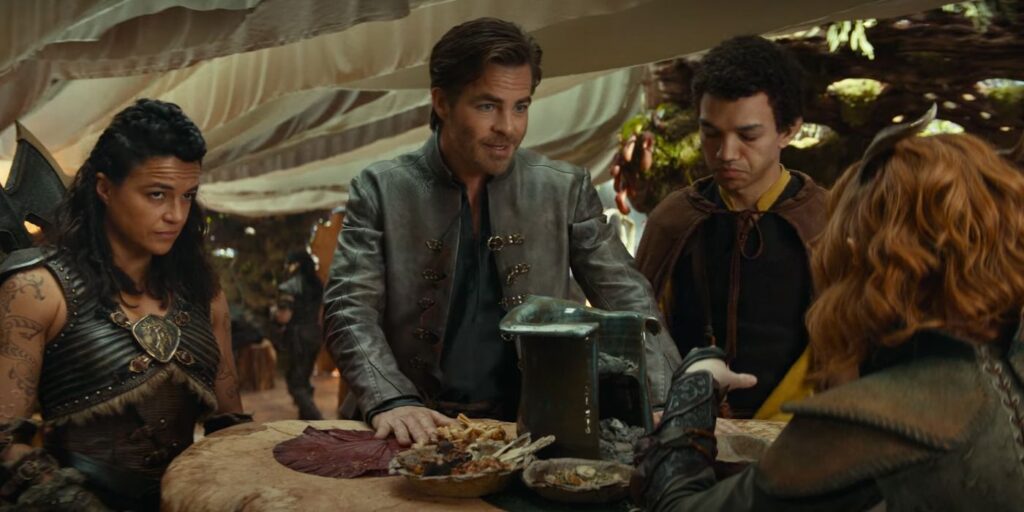
I’m always looking for that screenwriting angle to an industry story.
So when I see that Dungeons and Dragons couldn’t quite manage 40 million dollars on its opening weekend in an industry where big-budget films need to make 60 million dollars *AT LEAST* to be considered a success, I ask, “What can we learn from this?”
Or when I see that last weekend’s belle of the ball, John Wick 4, dropped a significant 62% in its second weekend (John Wick 3 dropped only 56% in its second weekend), I openly wonder, “Is there a writing issue here?”
Let’s start with Dungeons and Dragons. I don’t think it matters what you do with this property – it’s not going to work. The primary problem is, when I say, “Dungeons and Dragons” and ask you what images come to mind, I’m guessing the answer is “nothing.” Because it’s not like Star Wars where you immediately think of lightsabers. Or Lord of the Rings where you have clear images in your head of creatures like Gollum. Or Marvel, where you imagine a dozen different superheroes.
Dungeons and Dragons literally makes you think of a generic looking dragon. Or a generic looking cave. Or a generic looking orc. There’s no specific imagery. And specific imagery is what sets IP apart from original ideas. If I pitch you a Peter Pan movie, that’s going to put a specific image in your mind, compared to if I pitch you a Flyborne Felix movie.
That makes Dungeons and Dragons one of the rare instances of IP that operates like an original idea. It’s not bringing IP value to IP. Which is the whole point of IP!
Another problem with Dungeons and Dragons is the studio’s attempt to turn it into a comedy. I know a few people who play the game. I don’t personally play it. But my understanding is that it’s not a comedic game. It’s more of a strategic game that the people who love take seriously.
If superhero movies have taught us anything, it’s that the closer you draw from the source material, the better. By making the Dungeons and Dragons movie highly comedic, aren’t you moving away from the source material? Are Dungeons and Dragons players the types who say, “Man, did you hear how funny they made Dungeons and Dragons? I gotta see that. It’s such a good idea to make it funnier!” I’m guessing nobody said that.
Which goes back to the truth of the matter, which is that this isn’t a solid enough property to build a franchise on. It just isn’t. And the box office bore this reality out. That’s something every writer should be aware of: Is my idea good enough to write a script about? Because, if it isn’t, it doesn’t matter how good your execution is. It doesn’t matter what your angle is. Your idea was never strong enough to support a feature film.
Which is why I can complain about how Dungeons and Dragons shouldn’t have been so comedic but I know that even if they’d gone the serious route, it was still going to tank. Cause it’s built on top of a weak foundation. There’s not a single recognizable character or creature here. So it’s not surprising that D&D, like its predecessor in 2000, will fade into the night, never to be remembered again.
Our second big movie lesson comes from John Wick 4’s big second weekend dip. A 62% drop isn’t as bad as Quantumania’s 70% drop. But like I said above, it’s a fairly significant drop compared to the third film, and this from a movie that’s gotten a lot more attention. So what’s going on here?
 No, you are not experiencing deja-vu. This move is happening for the 980th time this movie.
No, you are not experiencing deja-vu. This move is happening for the 980th time this movie.
At first I thought it was the length. That’s what she said. But Avatar 2 and its 9-hour running time becoming one of the highest grossing movies ever put that theory to rest. But I do think time is a part of the problem, specifically REPETITION. This is something I see all the time in weak scripts, which is the repetition of things we’ve already seen.
John Wick’s biggest weakness is its insistence on fighting and shootouts that repeat the same moment over and over again. I mean, how many times did we see John Wick grapple with someone, shoot him a few times, kick and punch, before taking them down and shooting them to death. There literally had to be 75 kills that played out in the exact same way.
If they would’ve cut those in half, not only is the movie going to move faster, but the kills then take on more significance, since the rarer something is, the more valuable it is.
For any movie, the opening box office of the film is based on five things – the concept, the directing, the IP, the marketing, and the cast. But the second weekend is based on one thing: THE WRITING. If the writing is good, everybody who saw your movie on that opening weekend will tell their friends and talk it up on social media. That’s when you get small second weekend drops. If you get a big dip, the issue is the writing.
This is not surprising for the John Wick universe, as this property has never been about the writing. Even John Wick is more of a movie star persona (Keanu Reeves) than a character. We don’t really know anything about John Wick other than he likes to shoot guns. He’s similar to Ethan Hunt in Mission Impossible. The average person who watches Mission Impossible doesn’t even know Ethan Hunt’s name. They know him as Tom Cruise.
Movie star driven movies can work. I’m not bashing them. The problem becomes when you rest on that and don’t think you need to write as good of a script because of it. A lot of these big movies fall into that trap. John Wick 4 dropped the ball there. They became so obsessed with the production design and the fighting choreography that no one thought to say, “Hey, maybe we shouldn’t have 6000 fights that look exactly the same.”
Cause I’ll be honest with you. I almost didn’t give John Wick 4 a passing grade. Specifically because it was so much of the same moment over and over.
The good news is, we’ve got “Air” coming up next weekend. It’s a great script that broke into my Top 25. The movie’s supposed to be just as good as the screenplay. Previously, I only had the review inside a newsletter. But for those who don’t receive my newsletter (e-mail carsonreeves1@gmail.com with subject line: NEWSLETTER to sign up) I’m including the review below, when the script was titled, “Air Jordan.”
Genre: Sports Drama
Premise: In 1984, an out-of-shape bulldog of a sports executive at a small shoe company called Nike attempts to sign the hottest basketball player out of college, Michael Jordan.
About: This is that big splashy deal that just came together. Ben Affleck will direct (and star). Matt Damon will star. Amazon is the buyer. This is a huge win for the writer, Alex Convery, who doesn’t even have a produced credit yet. I’ve reviewed a couple of his scripts, Bag Man and Excelsior, both of which I liked. So this guy’s got the goods. No doubt this project came together in the wake of the success of HBO’s Winning Time.
Writer: Alex Convery
Details: 104 pages.

As someone who grew up in Chicago during the Jordan era and who used to routinely go to the old Chicago Stadium to watch the Bulls play, I can say that I am both excited and not so excited for this script.
I’m excited because I get to go back in time and relive some powerful memories. I’m not excited because I’m not convinced there’s a story to tell here. When you’re going so deep into the Jordan mythology that you’re covering some orbiter of an orbiter of Jordan’s sun, you’re testing the limits of what people care about. I mean, what’s next? The story of Cher’s first hairdresser’s assistant?
Then again, isn’t that all scripts? You don’t care until you do. Let’s see if we do!
45 year old slovenly Italian-American Nike shoe executive Sonny Vaccaro is looking at an uncertain future. He works in the basketball department for Nike, a tiny shoe company that specializes almost exclusively in its CEO’s first love, running.
In 1984, Nike doesn’t care about basketball because nobody cares about basketball. The NBA championship isn’t even broadcast live! So it makes sense why Sonny’s boss, Phil Knight, is only giving the basketball department 250,000 dollars to sign three rookie basketball players to shoe deals.
Now you have to understand, back then, there was no such thing as a personalized shoe. You wore whatever shoes the companies made. And Adidas and Converse had much cooler shoes than anything Nike had created.
While the rest of his team is resigned to signing scrub basketball players, Sonny is obsessed with getting Michael Jordan, a huge problem because Phil won’t give him the money to sign him and Jordan’s agent, David Falk, says Jordan doesn’t even want to meet with Nike. He’s set on Adidas.
This is when Sonny has his epiphany: A PERSONALIZED shoe built around the player. They’re going to mold it to his foot. They’re going to design it the way he wants it designed. And they’re going to give it a name – Air Jordan – that will work to market him while he’s playing.
Now all Sonny has to do is figure out a way to get in front of Jordan and make his pitch. When all avenues fail, Sonny heads out to North Carolina to talk to Jordan’s parents. Used to slimy tactics from agents and executives at this point, they don’t want any part of Sonny. But while Sonny can’t dunk from the free throw line, he does have a superpower of his own: HE NEVER STOPS TRYING. And he will pursue Jordan til the bitter end.
The first thing that comes to mind when I read a script like this is a rarely talked about writing tool, which is audience dramatic irony. Traditional dramatic irony is when the audience knows something the main character does not. Audience dramatic irony is when the audience knows more than every single character in the story. Titanic is an example. We know the ship is sinking. They don’t.
Audience dramatic irony can be played to all sorts of effect and is perfect for scripts like this, where the audience already knows a bunch of details. For example, there’s an ongoing discussion within Nike on whether Michael Jordan is worth spending their entire basketball budget of 250,000 dollars on. We, of course, know that Michael Jordan will be worth billions of dollars to Nike in the future. So it’s funny to watch them squabbling over such a minuscule number.
Or you get moments like Sonny meeting with the general manager of the Portland Trailblazers, who infamously passed on Michael Jordan with the number one pick (The Chicago Bulls would end up picking him at number 3). Sonny is trying to figure out from the guy why he passed on Jordan, try to get a little intel to help him decide what to do. After a while, the GM gets annoyed with Sonny’s line of questioning and says, “What, you think I’m going to be remembered as the man who passed on Michael Jordan? Come on, Sonny. Players come and go. No one’s remembered for just one player.”
But the big reason this script works and the reason it will be a hit is because of one of the most basic screenwriting principles in the book – IT’S GOT A MAIN CHARACTER WHO WANTS SOMETHING REALLY BADLY AND HE GOES AFTER IT WITH ALL HE’S GOT.
This whole script is about a guy determined to get something – sign Jordan. That’s it. We always feel like we’re moving forward because every interaction Sonny has is for that larger goal. This is when scripts really cook, when you institute this simple principle. It’s when characters have muddled motivations and don’t really care about what they’re after that scripts become boring (later Scriptshadow Edit: look no further than the third season of The Mandalorian).
Once you establish that drive to succeed, you simply make succeeding as hard as possible. Sonny’s boss, Phil Knight, won’t give him the budget he needs to sign Jordan. Jordan’s agent, David Falk, tells him don’t even try. Jordan’s signing with Adidas. Jordan’s parents tell Sonny, “He’s not going to sign with you. Give up.”
What readers and audiences like is determined characters going up against giant “no’s” who then overcome those no’s one by one. The reason audiences connect so closely with this formula is because most people in life get beaten down by obstacles. At a certain point, they give up. So to see someone not give up is wish-fulfilling and life-affirming. Because they say, “Well, this guy can do it. Why can’t I?” And they leave that script or that movie charged up.
An ancillary benefit of this is that many of your scenes will write themselves. Think about it. You have a guy who needs something badly. You have a line of characters who want to keep him from getting it. This ensures that EVERY SINGLE SCENE is set up to succeed. Because the best scenes tend to be when someone wants something and someone else doesn’t want to give it to them. Writers do mental cartwheels trying to find scenarios that will allow them to use this formula in as many scenes as possible. However, when it’s baked into the premise, like it is with “Air Jordan,” you just show up for the scene “room” and the chairs and tables have already been arranged for you.
It’s also a really fast script to read because it’s all dialogue. And this is something I tell writers all the time: If you’re good at dialogue, write scripts where all anybody does is talk because those scripts read the fastest. And “a fast read” is crack to a busy industry person.
I tried reading a professional script the other day and it was like walking through quicksand with boots made of concrete getting through those pages as it was all really dull and elongated description. This is the opposite. Every scene is the dialogue-friendly character of Sonny walking into a room and trying to convince another character of something.
Totally see why Matt and Ben fell in love with this. Air Jordan is a slam dunk.
[ ] What the hell did I just read?
[ ] wasn’t for me
[xx] worth the read
[ ] impressive
[ ] genius
What I learned: Strike when you’ve got a screenplay that exists in the same world as something that’s hot right now. A script about otters is dead in the water until, one day, a movie about beavers clears 100 million in its first weekend at the box office. Air Jordan, no doubt, started getting pushed heavily around town once the documentary, Winning Time, became a hit. If you’ve got anything that’s similar to a movie or show that everyone’s talking about, call every contact you know, no matter how peripheral, and pitch your script to them. If it’s anything close to that hot new successful thing, they’ll want to read it.
What I learned 2: For the really savvy screenwriter, track shows that are similar to your idea BEFORE THEY GET ON AIR. You are waiting for them to do well so that when they do, you have already lined up your ducks. I bet my Jordan memories that’s what happened here. They saw that Winning Time was coming out and built a campaign around sending that script to everyone once the buzz for the show ratcheted up. You’re playing with the big boys here. Do your prep work and stay ahead of the curve.

